英语作文自评互评表教学提纲
英语作文的自评和互评
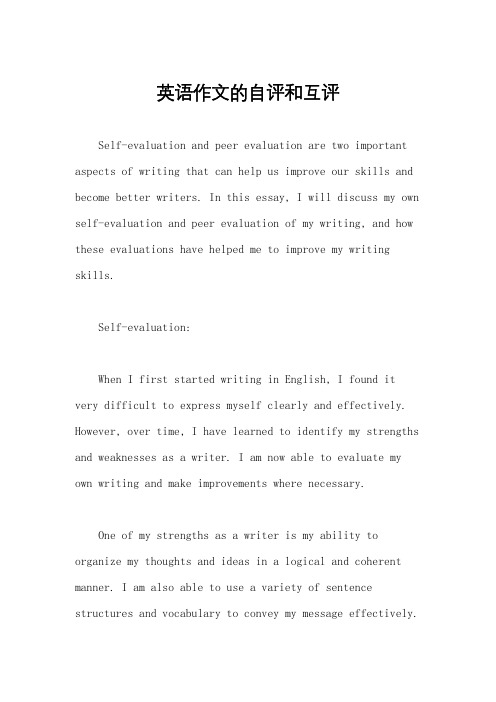
英语作文的自评和互评Self-evaluation and peer evaluation are two important aspects of writing that can help us improve our skills and become better writers. In this essay, I will discuss my own self-evaluation and peer evaluation of my writing, and how these evaluations have helped me to improve my writing skills.Self-evaluation:When I first started writing in English, I found it very difficult to express myself clearly and effectively. However, over time, I have learned to identify my strengths and weaknesses as a writer. I am now able to evaluate my own writing and make improvements where necessary.One of my strengths as a writer is my ability to organize my thoughts and ideas in a logical and coherent manner. I am also able to use a variety of sentence structures and vocabulary to convey my message effectively.However, one of my weaknesses is my tendency to use passive voice in my writing, which can make my writing sound dull and uninteresting.To improve my writing skills, I have been working on using more active voice in my writing. I have also been practicing writing more complex sentences and using more descriptive language to make my writing more engaging. I have found that these strategies have been helpful in improving my writing skills.Peer evaluation:Peer evaluation is also an important aspect of writing that can help us to improve our skills. When I receive feedback from my peers, I am able to identify areas where I need to improve and make changes to my writing accordingly.In one of my recent writing assignments, I received feedback from my peers that my argument was not clear and that I needed to provide more evidence to support my claims.I took this feedback into consideration and revised mywriting to include more evidence and to clarify my argument. This helped me to improve my writing and to make my argument more persuasive.Conclusion:Self-evaluation and peer evaluation are important tools for improving our writing skills. By identifying our strengths and weaknesses as writers and receiving feedback from our peers, we can make changes to our writing thatwill help us to become better writers. I will continue to use these strategies to improve my writing skills and to become a more effective communicator.。
高中英语写作教学中学生自评和互评的运用
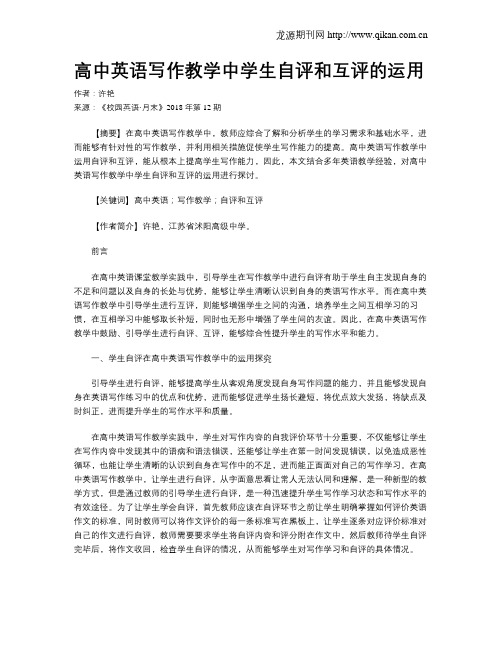
龙源期刊网 高中英语写作教学中学生自评和互评的运用作者:许艳来源:《校园英语·月末》2018年第12期【摘要】在高中英语写作教学中,教师应综合了解和分析学生的学习需求和基础水平,进而能够有针对性的写作教学,并利用相关措施促使学生写作能力的提高。
高中英语写作教学中运用自评和互评,能从根本上提高学生写作能力,因此,本文结合多年英语教学经验,对高中英语写作教学中学生自评和互评的运用进行探讨。
【关键词】高中英语;写作教学;自评和互评【作者简介】许艳,江苏省沭阳高级中学。
前言在高中英语课堂教学实践中,引导学生在写作教学中进行自评有助于学生自主发现自身的不足和问题以及自身的长处与优势,能够让学生清晰认识到自身的英语写作水平。
而在高中英语写作教学中引导学生进行互评,则能够增强学生之间的沟通,培养学生之间互相学习的习惯,在互相学习中能够取长补短,同时也无形中增强了学生间的友谊。
因此,在高中英语写作教学中鼓励、引导学生进行自评、互评,能够综合性提升学生的写作水平和能力。
一、学生自评在高中英语写作教学中的运用探究引导学生进行自评,能够提高学生从客观角度发现自身写作问题的能力,并且能够发现自身在英语写作练习中的优点和优势,进而能够促进学生扬长避短,将优点放大发扬,将缺点及时纠正,进而提升学生的写作水平和质量。
在高中英语写作教学实践中,学生对写作内容的自我评价环节十分重要,不仅能够让学生在写作内容中发现其中的语病和语法错误,还能够让学生在第一时间发现错误,以免造成恶性循环,也能让学生清晰的认识到自身在写作中的不足,进而能正面面对自己的写作学习。
在高中英语写作教学中,让学生进行自评,从字面意思看让常人无法认同和理解,是一种新型的教学方式,但是通过教师的引导学生进行自评,是一种迅速提升学生写作学习状态和写作水平的有效途径。
为了让学生学会自评,首先教师应该在自评环节之前让学生明确掌握如何评价英语作文的标准,同时教师可以将作文评价的每一条标准写在黑板上,让学生逐条对应评价标准对自己的作文进行自评,教师需要要求学生将自评内容和评分附在作文中,然后教师待学生自评完毕后,将作文收回,检查学生自评的情况,从而能够学生对写作学习和自评的具体情况。
英语作文同伴互评表
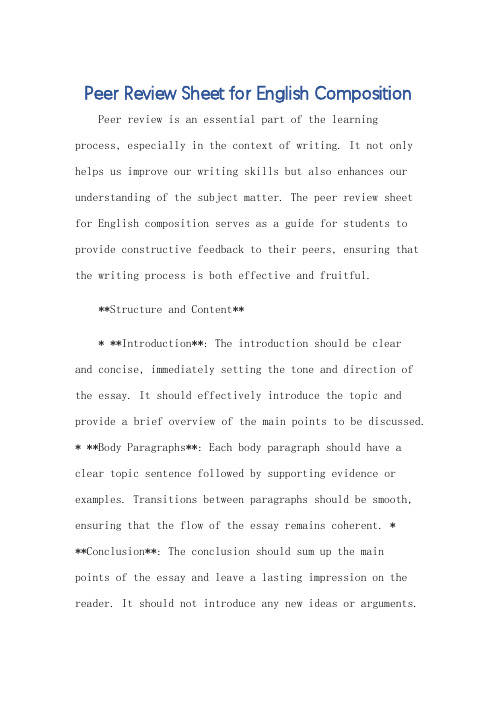
Peer Review Sheet for English CompositionPeer review is an essential part of the learning process, especially in the context of writing. It not only helps us improve our writing skills but also enhances our understanding of the subject matter. The peer review sheet for English composition serves as a guide for students to provide constructive feedback to their peers, ensuring that the writing process is both effective and fruitful.**Structure and Content*** **Introduction**: The introduction should be clearand concise, immediately setting the tone and direction of the essay. It should effectively introduce the topic and provide a brief overview of the main points to be discussed. * **Body Paragraphs**: Each body paragraph should have a clear topic sentence followed by supporting evidence or examples. Transitions between paragraphs should be smooth, ensuring that the flow of the essay remains coherent. ***Conclusion**: The conclusion should sum up the mainpoints of the essay and leave a lasting impression on the reader. It should not introduce any new ideas or arguments.**Language and Grammar*** **Vocabulary**: A range of vocabulary should be used appropriately to convey the ideas effectively. Avoid repeating the same words or phrases excessively. ***Grammar**: Correct grammar is crucial in writing. Sentences should be structured correctly, with appropriate punctuation and tense usage. * **Style**: The writing style should be appropriate to the target audience and the purpose of the essay. Avoid using colloquial or informal language.**Content Evaluation*** **Relevance**: The content of the essay should be relevant to the topic. Ensure that all ideas and examples are directly related to the main argument. * **LogicalFlow**: The essay should have a logical flow, with ideas and examples supporting the main argument. Avoid introducing irrelevant or tangential information. ***Critical Analysis**: The essay should include a critical analysis of the topic, discussing both sides of the argument and providing a balanced perspective.**Recommendations for Improvement*** **Clarity**: If any part of the essay is unclear or ambiguous, suggest ways to improve clarity and make the ideas more accessible to the reader. * **Evidence and Examples**: If the essay lacks sufficient evidence or examples to support the main argument, suggest adding relevant information or sources. * **Structure**: If the structure of the essay seems disorganized or incoherent, suggest ways to improve the flow and coherence of the writing.Peer review is a mutual learning process that benefits both the writer and the reviewer. By providing constructive feedback and suggestions for improvement, we can help each other become better writers and thinkers. The peer review sheet for English composition serves as a valuable tool in this process, guiding us towards more effective and engaging writing.**英语作文同伴互评表**在英语学习中,同伴互评是一个至关重要的环节,特别是在写作方面。
英语作文自评互评模板初一
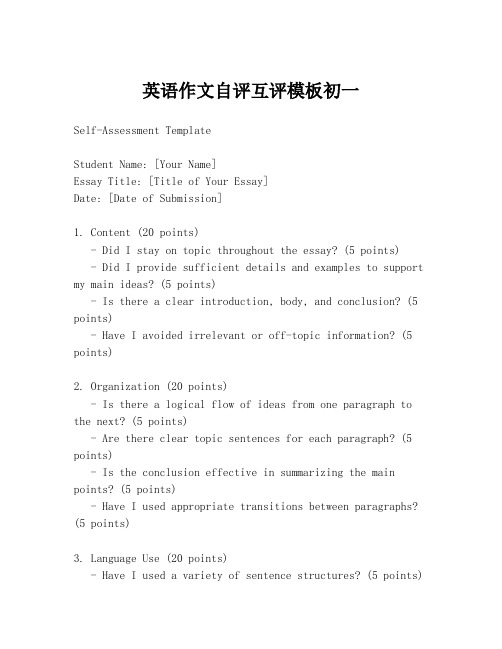
英语作文自评互评模板初一Self-Assessment TemplateStudent Name: [Your Name]Essay Title: [Title of Your Essay]Date: [Date of Submission]1. Content (20 points)- Did I stay on topic throughout the essay? (5 points)- Did I provide sufficient details and examples to support my main ideas? (5 points)- Is there a clear introduction, body, and conclusion? (5 points)- Have I avoided irrelevant or off-topic information? (5 points)2. Organization (20 points)- Is there a logical flow of ideas from one paragraph to the next? (5 points)- Are there clear topic sentences for each paragraph? (5 points)- Is the conclusion effective in summarizing the main points? (5 points)- Have I used appropriate transitions between paragraphs?(5 points)3. Language Use (20 points)- Have I used a variety of sentence structures? (5 points)- Are my sentences grammatically correct? (5 points)- Have I used appropriate vocabulary to express my ideas? (5 points)- Is the tone of the essay appropriate for the intended audience? (5 points)4. Mechanics (20 points)- Are there any spelling errors? (5 points)- Is punctuation used correctly? (5 points)- Are the paragraphs indented and lined spaced properly?(5 points)- Is the essay formatted according to the required style (e.g., MLA, APA)? (5 points)5. Creativity and Originality (20 points)- Have I presented my ideas in a unique or interesting way?(10 points)- Is there evidence of personal reflection or insight? (10 points)Total Points: /100Reflective Comments:[Include any comments on what you believe you did well and areas where you think you could improve.]Peer Evaluation TemplateEvaluator Name: [Your Name]Essay Title: [Title of Peer's Essay]Date: [Date of Evaluation]1. Content (20 points)- Does the essay stay on topic? (5 points)- Are there sufficient details and examples? (5 points)- Is the structure of the essay clear (introduction, body, conclusion)? (5 points)- Is all information relevant to the topic? (5 points)2. Organization (20 points)- Is the flow of ideas logical? (5 points)- Are there clear topic sentences? (5 points)- Is the conclusion effective? (5 points)- Are transitions between paragraphs used effectively? (5 points)3. Language Use (20 points)- Is there a variety of sentence structures? (5 points)- Are there any grammatical errors? (5 points)- Is the vocabulary appropriate and effectively used? (5 points)- Is the tone suitable for the audience? (5 points)4. Mechanics (20 points)- Are there spelling errors? (5 points)- Is punctuation correct? (5 points)- Are paragraphs indented and lined spaced properly? (5 points)- Is the essay formatted correctly? (5 points)5. Creativity and Originality (20 points)- Are the ideas presented in a unique way? (10 points)- Is there personal reflection or insight? (10 points)Total Points: /100Constructive Feedback:[Provide specific feedback on what your peer did well and suggestions for improvement.]Strengths:[Mention the strengths of the essay.]Areas for Improvement:[Suggest areas where the writer can improve.]Both templates are designed to guide students through a structured process of evaluating their own work and the work of their peers. This approach encourages critical thinking and self-reflection, which are key skills for academic and personal growth.。
学生英语能力自评╱互评表

附2:学生英语能力自评/互评表使用说明1.《学生英语能力自评/互评表》细化和列举了一般要求、较高要求和更高要求中的各项语言技能,可以帮助教师更好地理解不同层次的教学要求,在教学中增强针对性。
教师还可以根据本校的大学英语教学大纲,补充或调整有关的微技能。
2.在教学开始时,教师向学生介绍自评/互评表中各项微技能,帮助学生了解教学要求。
3.教师定期要求学生进行自评和互评,通过评估,帮助学生了解自己对语言微技能的掌握情况,及时调整学习行为。
4.学生在自评/互评表右面的“评价”栏中对自己或同学的英语能力做出评估,能够做到的打钩()。
根据自评或互评的结果,参考下表中的提示,对下一阶段的学习作出相应安排。
优良中差能掌握各项语言技能中所有的微技能;完全达到本层次的教学要求。
能掌握各项语言技能中3/4左右的微技能;较好地达到本层次的教学要求,稍加努力,可望实现学习目标。
能掌握各项语言技能中2/3左右的微技能;基本达到本层次的教学要求,但仍应继续努力。
未能掌握各项语言技能中1/2的微技能;未达到本层次的教学要求,应寻求指导,调整学习方法和计划。
自评和互评结果记录可以参考下表:日期(年/月/日)评估方式()评估结果(优、良、中、差)自评互评听说读写译3表1:一般要求评价听力/Listening我能听懂英语授课,并能根据要求进行讨论、发言。
我能听懂与所学内容相关、语速稍慢(每分钟130-150词)的对话、短文、报告等音像材料,并能理解其要点。
我能听懂慢速英语节目,如新闻、科学报导、历史故事等。
我能听懂指示语,如指路、如何做某事、操作指南等,能听懂数字(基数与序数)、时间等。
我能听懂讨论的主题,能掌握其中心大意,抓住要点。
我能在听的过程中使用基本的听力技巧。
口语/Speaking我能回答课上的提问,能用常用词汇和句型与同学进行讨论,能就所熟悉的话题经准备后作简短发言。
我能介绍自己、同学、朋友等,并能对他人的介绍做出回应。
学生自评与互评在高中英语写作教学中的运用
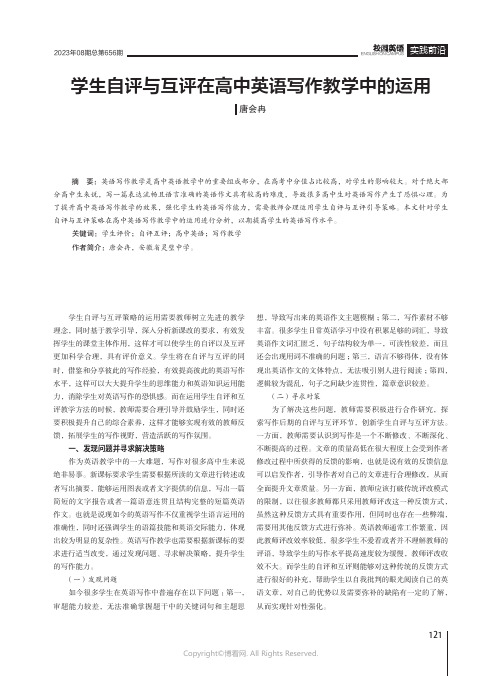
ENGLISH ON CAMPUS2023年08期总第656期学生自评与互评在高中英语写作教学中的运用摘 要:英语写作教学是高中英语教学中的重要组成部分,在高考中分值占比较高,对学生的影响较大。
对于绝大部分高中生来说,写一篇表达流畅且语言准确的英语作文具有较高的难度,导致很多高中生对英语写作产生了恐惧心理。
为了提升高中英语写作教学的效果,强化学生的英语写作能力,需要教师合理运用学生自评与互评引导策略。
本文针对学生自评与互评策略在高中英语写作教学中的运用进行分析,以期提高学生的英语写作水平。
关键词:学生评价;自评互评;高中英语;写作教学作者简介:唐会冉,安徽省灵璧中学。
学生自评与互评策略的运用需要教师树立先进的教学理念,同时基于教学引导,深入分析新课改的要求,有效发挥学生的课堂主体作用,这样才可以使学生的自评以及互评更加科学合理,具有评价意义。
学生将在自评与互评的同时,借鉴和分享彼此的写作经验,有效提高彼此的英语写作水平,这样可以大大提升学生的思维能力和英语知识运用能力,消除学生对英语写作的恐惧感。
而在运用学生自评和互评教学方法的时候,教师需要合理引导并鼓励学生,同时还要积极提升自己的综合素养,这样才能够实现有效的教师反馈,拓展学生的写作视野,营造活跃的写作氛围。
一、发现问题并寻求解决策略作为英语教学中的一大难题,写作对很多高中生来说绝非易事。
新课标要求学生需要根据所读的文章进行转述或者写出摘要,能够运用图表或者文字提供的信息,写出一篇简短的文字报告或者一篇语意连贯且结构完整的短篇英语作文。
也就是说现如今的英语写作不仅重视学生语言运用的准确性,同时还强调学生的语篇技能和英语交际能力,体现出较为明显的复杂性。
英语写作教学也需要根据新课标的要求进行适当改变,通过发现问题、寻求解决策略,提升学生的写作能力。
(一)发现问题如今很多学生在英语写作中普遍存在以下问题:第一,审题能力较差,无法准确掌握题干中的关键词句和主题思想,导致写出来的英语作文主题模糊;第二,写作素材不够丰富。
高中英语写作教学中学生自评与互评的应用策略
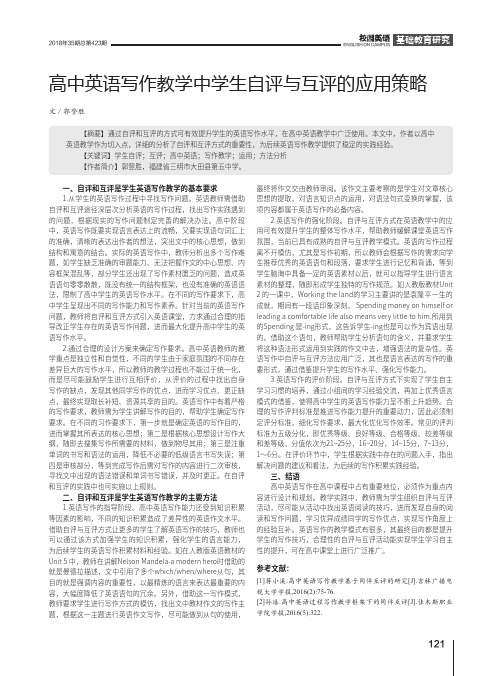
2018年35期总第423期基础教育研究ENGLISH ON CAMPUS高中英语写作教学中学生自评与互评的应用策略文/郭登胜一、自评和互评是学生英语写作教学的基本要求1.从学生的英语写作过程中寻找写作问题。
英语教师需借助自评和互评途径深层次分析英语的写作过程,找出写作实践遇到的问题,根据现实的写作问题制定完善的解决办法。
高中阶段中,英语写作既要实现语言表达上的流畅,又要实现语句词汇上的准确,清晰的表达出作者的想法,突出文中的核心思想,做到结构和寓意的结合。
实际的英语写作中,教师分析出多个写作难题,如学生缺乏准确的审题能力、无法把握作文的中心思想、内容框架混乱等,部分学生还出现了写作素材匮乏的问题,造成英语语句零零散散,既没有统一的结构框架,也没有准确的英语语法,限制了高中学生的英语写作水平。
在不同的写作要求下,高中学生呈现出不同的写作能力和写作素养。
针对当前的英语写作问题,教师将自评和互评方式引入英语课堂,力求通过合理的指导改正学生存在的英语写作问题,进而最大化提升高中学生的英语写作水平。
2.通过合理的设计方案来确定写作要求。
高中英语教师的教学重点是独立性和自觉性,不同的学生由于家庭氛围的不同存在差异巨大的写作水平,所以教师的教学过程也不能过于统一化,而是尽可能鼓励学生进行互相评价,从评价的过程中找出自身写作的缺点,发现其他同学写作的优点,进而学习优点、更正缺点,最终实现取长补短、资源共享的目的。
英语写作中有着严格的写作要求,教师需为学生讲解写作的目的,帮助学生确定写作要求。
在不同的习作要求下,第一步就是确定英语的写作目的,进而掌握其所表达的核心思想;第二是根据核心思想设计写作大纲,随即去搜集写作所需要的材料,做到物尽其用;第三是注重单词的书写和语法的运用,降低不必要的低级语言书写失误;第四是审核部分,等到完成写作后需对写作的内容进行二次审核,寻找文中出现的语法错误和单词书写错误,并及时更正。
自评和互评在高中英语写作教学中的运用

自评和互评在高中英语写作教学中的运用作者:唐继中来源:《新课程·下旬》2018年第11期摘要:在高中英语的教学过程中,写作是英语学习中一项重要的组成部分。
学生和教师在写作上花费的时间较多,希望能够通过各种各样的方法让学生在写作过程中取得良好的效果,提高学生的写作能力。
自评和互评的方式应用,在高中英语写作中能够让学生有一个很好的效果,教师可以根据实际情况进行合理的应用。
关键词:自评;互评;高中英语;写作教学在高中的英语教学中,学生对英语的学习程度逐渐加深,教师也对学生学习英语的要求更加严格。
在写作的学习过程中,学生的能力参差不齐,在写作中出现的问题较多,教师应当合理地运用一些教学方法,让学生提高自身的写作能力和水平。
教师可以采用学生自评和互评的教学方式,提高学生对英语写作的积极性,让学生积极的学习态度转化为主动的学习行为。
一、学生自评提高对自身的要求在高中英语写作学习过程中,传统的学习方法已经不适应于现代的学习,现代教育越来越提倡素质化教育,让学生在学习中能够多方面发展,因此,在英语写作教学中,教师可以另辟蹊径,对教学方法多加思考,采用学生自评的方式,让学生提高写作能力。
学生自评对英语写作的教学有着非常积极的作用。
从英语写作的质量上来看,学生完成一篇英语写作之后,采用自评的方式,可以检查到在英语写作中出现的问题,是否在单词方面有拼写错误的情况,标点符号是否使用正确,在整体重新观看写作成果的同时,还可以让学生对自己的书写进行一定的评价,从内心鞭策自己向更好的方向发展。
学生往往第一遍写作时处于一个比较着急的状态,语法和句式有可能会出现错误,通过采用自评的方式,阅读自己的文章,可以让学生对第一次书写完成的句子进行修改,了解自己在语法中犯的错误和不足,更加利于之后的学习。
英语写作的练习在英语整体的学习中占的比例非常大,而且也是对学生英语综合能力的一种考查。
学生应当采用正确的自评方式,进行英语写作的评价练习。
英语作文自评互评表.docx

英语作文自评互评表:
班级:姓名:学号:
评价级别
A B C D自评小组评师评参照标准
字体是否字体工整,字体基本字体欠工字体潦草,
工整,拼写拼写正确,工整,有少整,有涂改有多处涂
是否正确,作业整洁许错误,作现象,文中改,很多错
作业是否业基本整有一些错误,字数不
干净洁误够
语法、词汇应用了较能应用一语法结构文章语法
运用是否多的语法些语法结单调、词汇错误较多,
正确结构和高构和词汇项目有限,词汇很有
级词汇不影响理限,影响理
解解
内容是否要点齐全,要点基本要点基本要点不全,
内容完整,齐全,内容齐全,内容
完整,要点
内容过于
是否齐全观点不明较完整,有较完整,内
确意义容一般简单
文章逻辑有效地使应用简单较少使用语句断短
性是否强,用了语句的语句间语句间的续续,行文
连接是否间的连接的连接成连接成分,不流畅,无
成分,使全分,使全文内容缺少连词过度
紧凑
文结构紧结构紧凑连贯性
凑
创造性有创造性,较有创造创意不够,没有创意,
表现力强性,简要,较完整内容不完
完整整。
自评与互评在高中英语写作教学中的运用
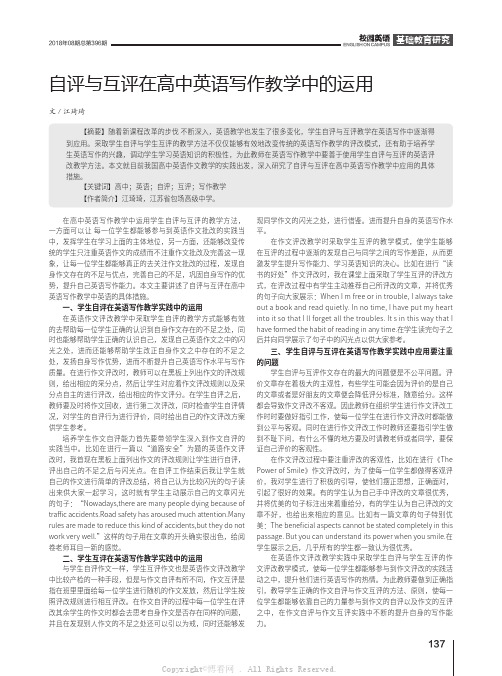
1372018年08期总第396期ENGLISH ON CAMPUS自评与互评在高中英语写作教学中的运用文/江琦琦【摘要】随着新课程改革的步伐 不断深入,英语教学也发生了很多变化,学生自评与互评教学在英语写作中逐渐得到应用。
采取学生自评与学生互评的教学方法不仅仅能够有效地改变传统的英语写作教学的评改模式,还有助于培养学生英语写作的兴趣,调动学生学习英语知识的积极性,为此教师在英语写作教学中要善于使用学生自评与互评的英语评改教学方法。
本文就目前我国高中英语作文教学的实践出发,深入研究了自评与互评在高中英语写作教学中应用的具体措施。
【关键词】高中;英语;自评;互评;写作教学【作者简介】江琦琦,江苏省包场高级中学。
在高中英语写作教学中运用学生自评与互评的教学方法,一方面可以让 每一位学生都能够参与到英语作文批改的实践当中,发挥学生在学习上面的主体地位,另一方面,还能够改变传统的学生只注重英语作文的成绩而不注重作文批改及完善这一现象,让每一位学生都能够真正的去关注作文批改的过程,发现自身作文存在的不足与优点,完善自己的不足,巩固自身写作的优势,提升自己英语写作能力。
本文主要讲述了自评与互评在高中英语写作教学中英语的具体措施。
一、学生自评在英语写作教学实践中的运用在英语作文评改教学中采取学生自评的教学方式能够有效的去帮助每一位学生正确的认识到自身作文存在的不足之处,同时也能够帮助学生正确的认识自己,发现自己英语作文之中的闪光之处,进而还能够帮助学生改正自身作文之中存在的不足之处,发扬自身写作优势,进而不断提升自己英语写作水平与写作质量。
在进行作文评改时,教师可以在黑板上列出作文的评改规则,给出相应的采分点,然后让学生对应着作文评改规则以及采分点自主的进行评改,给出相应的作文评分。
在学生自评之后,教师要及时将作文回收,进行第二次评改,同时检查学生自评情况,对学生的自评行为进行评价,同时给出自己的作文评改方案供学生参考。
浅谈高中生英语作文自评与互评能力的培养-2019年教育文档

浅谈高中生英语作文自评与互评能力的培养-2019年教育文档浅谈高中生英语作文自评与互评能力的培养一、问题提出的背景1.高中学生英语写作评价的现状。
教师和学生在英语作文上花了很多的精力,但“学生怕写,教师怕批”的现象普遍存在。
学生怕写的原因之一来自他们所受的消极评价,它阻碍了学生的创造力,打击了他们的自信心。
教师怕批是因为批改作文费时费力,但收效却不如人意,这挫伤了教师工作的积极性。
所以改革原有的英语写作评价方式,提高学生在写作教学中的主体地位,已成为新课改的必然趋势。
2.传统评价方式的弊端。
传统的评价方式在很大程度上忽视了学生在学习中的主体性、能动性和创造性,而不利于外语教学方法、内容和相应竞争机制的改革[2]。
目前高中英语写作的评价方式主要是:教师抽查批改或全收全改,然后课堂上讲评。
大部分教师采取的评价模式是:评价=纠错+分数+评语,讲评=归纳错误+展示佳文。
这样的评价方式过度注重分数,忽视帮助学生学会书面表达,提高写作的积极性,乐意用文字进行交流的真正目的。
在传统的作文评价体系中,老师批阅的分数起决定性作用,同学们容易忽略分数背后的内容。
而且,老师在批阅时留下的很多标记、符号都令学生倍感沮丧,使他们的写作热情逐渐丧失,以致害怕写作。
3.新课程呼唤教育评价方式的改革。
《基础教育课程改革纲要(试行)》指出:“评价不仅要关注学生的学业成绩,而且要发现和发展多方面的潜能,了解学生发展中的需求,帮助学生认识自我,建立自信。
发挥评价的教育功能,促进学生在原有水平上的发展。
”新课程呼唤新的评价方式,以促进新课程的有效教学,促使学生全面发展。
二、英语写作评价应遵循的原则自我评价是培养学生自主性学习必不可少的因素,他人评价也可促进学生的高水平思维和学习活动。
教学实践中发现,学生均能在积极,主动的情感支配下进行自评和互评,这样可以唤醒学生强烈的求知欲,从而渐渐提高他们的写作兴趣。
1.体现学生在评价中的主体地位。
小学生作文自评互评指导方法

小学生作文自评互评指导方法As a teacher, it is crucial to guide primary school students in self-evaluation and peer evaluation when it comes to their compositions. 作为一名教师,在指导小学生作文自评和互评方面是至关重要的。
Firstly, it is important to teach students how to evaluate their own compositions. 首先,教导学生如何评价自己的作文是非常重要的。
This can be done through providing them with a scoring rubric that outlines the criteria for a well-written composition. 这可以通过提供一个评分标准来实现,该标准概述了一个写作良好的作文的标准。
Students can then use this rubric to assess their own work by considering aspects such as content, organization, language use, and mechanics. 学生可以使用这个标准来评价他们自己的作品,例如内容、组织、语言运用和写作技巧。
In addition, providing students with examples of well-written compositions can help them understand what a good composition looks like. 此外,提供学生写作精彩的例子,可以帮助他们了解什么是高水平的作文。
By analyzing these examples, students can internalize the characteristics of a well-written composition and apply them to theirown writing. 通过分析这些例子,学生可以内化一篇高水平作文的特点,并将其应用到他们自己的写作中。
学生英语能力自评-互评表
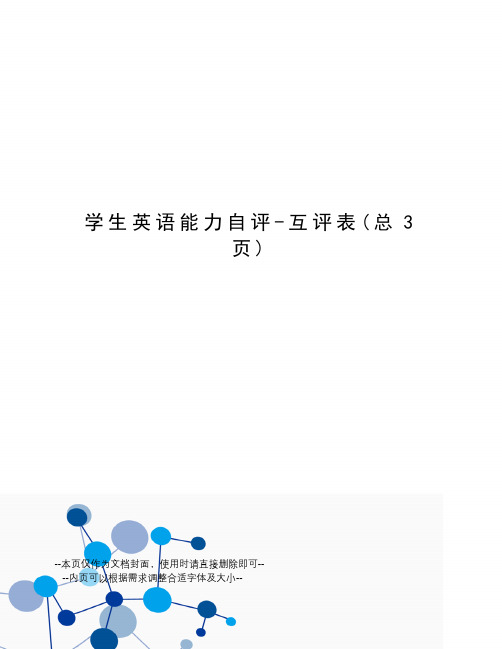
学生英语能力自评-互评表(总3
页)
--本页仅作为文档封面,使用时请直接删除即可--
--内页可以根据需求调整合适字体及大小--
学生英语能力自评/互评表
(摘自教育部高等教育司,2007,《大学英语课程教学要求》)
使用说明
1.《学生英语能力自评/互评表》细化和列举了一般要求、较高要求和更高要求中的各项语言技能,可以帮助教师更好地理解不同层次的教学要求,在教学中增强针对性。
教师还可以根据本校的大学英语教学大纲,补充或调整有关的微技能。
2.在教学开始时,教师向学生介绍自评/互评表中各项微技能,帮助学生了解教学要求。
3.教师定期要求学生进行自评和互评,通过评估,帮助学生了解自己对语言微技能的掌握情况,及时调整学习行为。
4.学生在自评/互评表右面的“评价”栏中对自己或同学的英语能力做出评估,能够做到的打钩()。
根据自评或互评的结果,参考下表中的提示,对下一阶段的学习作出相应安排。
优良中差
能掌握各项语言技能中所有的微技能;完全达到本层次的教学要求。
能掌握各项语言
技能中3/4左右
的微技能;较好
地达到本层次的
教学要求,稍加
努力,可望实现
学习目标。
能掌握各项语言
技能中2/3左右
的微技能;基本
达到本层次的教
学要求,但仍应
继续努力。
未能掌握各项语
言技能中1/2的
微技能;未达到
本层次的教学要
求,应寻求指
导,调整学习方
法和计划。
日期(年/月/日)
评估方式
()
评估结果(优、良、中、差)
自评互评听说读写译。
初中英语作文自评互评

初中英语作文自评互评My essay is about my favorite food, pizza. I think pizza is the best because it's so delicious and versatile. You can have so many different toppings like pepperoni, mushrooms, or even pineapple. The cheese is always gooey and the crust is crispy. It's the perfect meal for any occasion.I also love how easy it is to eat pizza. You can just pick it up with your hands and take a big bite. No need for fancy utensils or plates. It's great for parties or just a casual night in with friends. Plus, there are so many places that sell pizza, so you can always find a slice no matter where you are.I remember the first time I tried pizza. It was at a birthday party and I was hesitant at first, but as soon as I took that first bite, I was hooked. Now, whenever I have pizza, it brings back those fun memories of that party.It's amazing how food can be so closely tied to ouremotions and experiences.In conclusion, pizza will always have a special place in my heart. It's not just a food to me, it's a whole experience. Whether I'm sharing a slice with friends or enjoying a solo pizza night at home, it always brings me joy. I can't imagine my life without pizza, and I'm grateful for all the happiness it has brought me.。
作文自评和互评模板

作文自评和互评模板英文回答:Self-Evaluation and Peer-Review Template。
Self-Evaluation。
Thesis Statement: Is your thesis statement clear, concise, and arguable?Structure: Is your essay well-organized and easy to follow? Does it include an introduction, body paragraphs, and a conclusion?Evidence: Do you provide sufficient evidence tosupport your claims? Is your evidence credible and relevant?Analysis: Do you analyze your evidence thoroughly? Do you explain its significance and connect it to your thesis?Style: Is your writing clear, concise, and engaging? Do you use appropriate language and tone?Grammar and Mechanics: Are your sentences grammatically correct? Are there any spelling or punctuation errors?Peer-Review。
Thesis Statement: Is the thesis statement clear, concise, and arguable? Does it provide a clear direction for the essay?Structure: Is the essay well-organized and easy to follow? Does it include an introduction, body paragraphs, and a conclusion?Evidence: Does the writer provide sufficient evidence to support their claims? Is the evidence credible and relevant?Analysis: Does the writer analyze their evidencethoroughly? Do they explain its significance and connect it to their thesis?Style: Is the writing clear, concise, and engaging? Is the language appropriate and the tone consistent?Grammar and Mechanics: Are the sentences grammatically correct? Are there any spelling or punctuation errors?Additional Comments: Provide any additional feedback or suggestions that you think would help the writer improve their essay.中文回答:作文自评与互评模板。
初中英语作文自评互评

初中英语作文自评互评As a middle school English teacher, implementing self- and peer-assessment strategies in the classroom can be highly beneficial for students' learning process. Here's how we can approach this in the context of English composition:1. Self-Assessment:- Objective Setting: Begin by helping students set clear objectives for their writing. These could be related to grammar, vocabulary, coherence, or creativity.- Reflection: Encourage students to reflect on their work against the set objectives. A simple self-assessment form can be provided with criteria like 'excellent,' 'good,' 'needs improvement,' etc.- Feedback: Students should be taught to give themselves constructive feedback, identifying strengths and areas for improvement.2. Peer-Assessment:- Training: Before students start peer-assessment, it's crucial to train them on how to give and receive feedback. Emphasize the importance of being respectful and specific.- Guidelines: Provide a structured peer-assessment rubric that focuses on specific aspects of writing such as content, organization, language use, and mechanics.- Collaboration: Encourage a collaborative environment where students can discuss their work and the feedback they receive.3. Combining Both:- Iterative Process: After self-assessment, students can revise their work and then submit it for peer-assessment. This iterative process can lead to significant improvements. - Discussion: Facilitate a class discussion where students can share the feedback they received and how they plan to use it to improve their writing.4. Teacher's Role:- Oversight: While students are conducting self- and peer-assessments, the teacher should oversee the process to ensure it's being done effectively.- Validation: The teacher should validate the assessments by checking a selection of compositions and the feedback given.5. Benefits:- Ownership: Self-assessment promotes a sense of ownership over their learning.- Critical Thinking: Peer-assessment encourages critical thinking and analysis of writing.- Communication: It enhances communication skills as students discuss and justify their feedback.6. Challenges and Solutions:- Bias: Students may be biased. To mitigate this, rotate partners and emphasize the importance of objective feedback. - Time Management: The process can be time-consuming. Integrate it into the curriculum gradually to avoid overwhelming students.7. Conclusion:- Self- and peer-assessment are powerful tools for enhancing writing skills and fostering a deeper understanding of the writing process. When done correctly, they can lead to more engaged and self-reliant learners.By incorporating these strategies, we can create a more dynamic and effective learning environment for our students, where they take an active role in their own educational development.。
高中英语写作教学中学生自评和互评的运用

高中英语写作教学中学生自评和互评的运用作者:张瑞来源:《中学生英语·中旬刊》 2019年第4期写作向来都是高中英语教学中的难点,对于绝大多数的学生而言,可以写作一篇表达流畅、语义标准的文章都并非易事。
而写作评价作为高中英语写作教学中不可或缺的一环,以往写作评价的主体一直都是教师,学生很少参与到自身的文章评阅中来,这影响了学生写作学习的积极性,为此在倡导学生主体观念的新时代教学背景下,将自评与互评引入到高中英语写作教学中至为重要。
1. 高中英语写作教学中学生自评和互评的运用价值高中英语写作教学中学生自评和互评的运用,极大地强化了学生的主体作用,符合新课程教学理念倡导,因此具有重要的运用价值,对此笔者从以下几个方面做出分析。
首先有助于提高学生英语写作主动性,传统的写作教学只是让学生单纯地完成写作任务,作文评阅是教师的职责,这种教学方式使学生始终处于被动的位置,因此写作主动性无法得到有效的发挥。
而自评互评这种写作评价方式,最大限度地调动了学生主体参与,使学生获得传统的评价方式不能赋予的动力,这成为带动学生写作主动性的关键。
其次有助提升学生写作改错能力,学生自评、互评这种评价方式,旨在让学生自己挑出写作中存在的问题,通过对照教师提出的自评、互评细则,从而将错误自我消化,因此与教师代为评阅的写作评价方式,自评互评方法的运用,将更有助于推动学生主体写作能力得到进步提升。
2. 高中英语写作教学中学生自评和互评的运用策略2.1高中英语写作教学中学生自评“自评”是对传统写作反馈方式很好的补充,主要是指在学生写作初稿完成后,通过先阅读自身文章的方式,找出其中的问题。
但值得注意的是,自评活动并非完全是由学生单独进行,英语写作中的自评只是适当地让学生参与到自评活动中,教师在总体上还是处于指导地位,需要对整个自评过程进行引导和调控,对此笔者提出以下几个方面的建议。
(1)制定合理的写作自评标准。
自评虽然是一种很好的改评方式,但是很多学生并不具备这种能力,教师若是放手不管,学生的自评就犹如“丈二的和尚”,因此在高中英语写作自评活动开展中,教师需要为学生制定合理的自评标准。
英语作文自评与互评怎么写
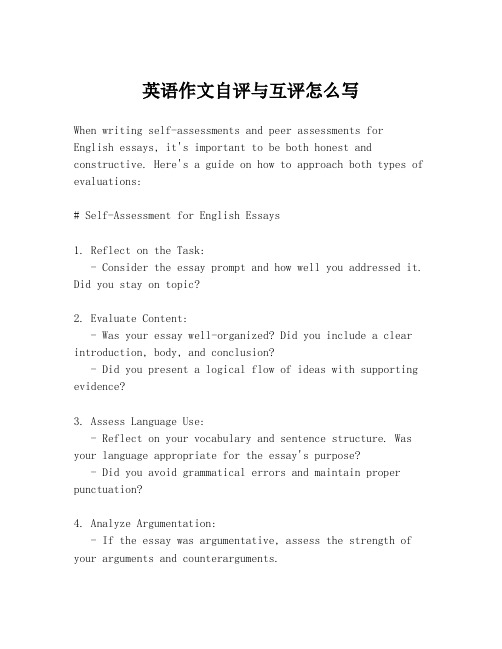
英语作文自评与互评怎么写When writing self-assessments and peer assessments for English essays, it's important to be both honest and constructive. Here's a guide on how to approach both types of evaluations:# Self-Assessment for English Essays1. Reflect on the Task:- Consider the essay prompt and how well you addressed it. Did you stay on topic?2. Evaluate Content:- Was your essay well-organized? Did you include a clear introduction, body, and conclusion?- Did you present a logical flow of ideas with supporting evidence?3. Assess Language Use:- Reflect on your vocabulary and sentence structure. Was your language appropriate for the essay's purpose?- Did you avoid grammatical errors and maintain proper punctuation?4. Analyze Argumentation:- If the essay was argumentative, assess the strength of your arguments and counterarguments.5. Review Originality:- Ensure your work is original and free from plagiarism.6. Consider Clarity and Coherence:- Was your essay easy to follow? Did your ideas connect smoothly?7. Self-Grade:- Assign a grade or score based on your evaluation.Example of Self-Assessment:"I believe I addressed the prompt effectively, providing a clear argument with supporting evidence. My essay is well-structured with a logical flow. However, I noticed a few grammatical errors that I need to correct. My vocabulary is adequate, but I could have used more varied sentence structures. Overall, I would give myself a B+."# Peer Assessment for English Essays1. Read Thoroughly:- Read the essay carefully to understand the content and structure.2. Comment on Clarity:- Is the essay easy to understand? Is the argument clear?3. Evaluate Argumentation:- Are the arguments persuasive? Are there any logical fallacies?4. Assess Language and Grammar:- Is the language appropriate for the essay's tone? Are there any grammatical or spelling errors?5. Note Originality:- Does the essay demonstrate original thought? Is there evidence of plagiarism?6. Provide Constructive Feedback:- Offer specific suggestions for improvement.7. Peer-Grade:- Give a grade or score based on your assessment.Example of Peer Assessment:"Your essay is well-organized and the main points are clear. However, I found a few instances where the argument could be strengthened with more concrete examples. There are minor grammatical errors that need attention. I would suggest revising the third paragraph for better clarity. Overall,it's a solid essay, and I would give it a B."Remember, the goal of both self-assessment and peer assessment is to provide feedback that helps improve writing skills and understanding of the essay's requirements. Be specific, fair, and supportive in your evaluations.。
作文自评互评评
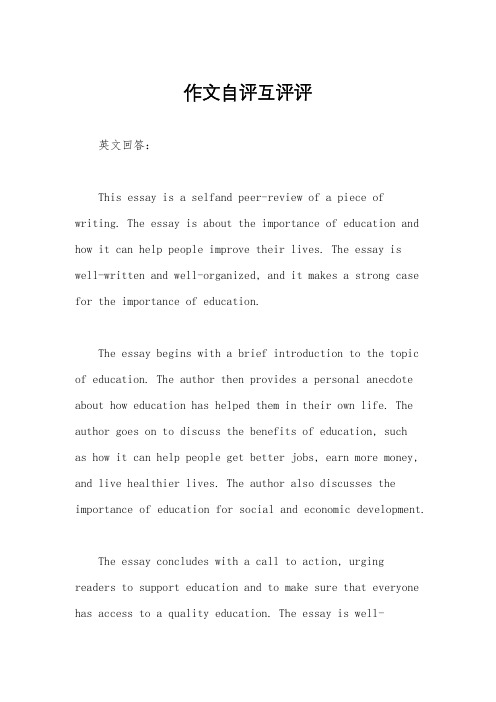
作文自评互评评英文回答:This essay is a selfand peer-review of a piece of writing. The essay is about the importance of education and how it can help people improve their lives. The essay iswell-written and well-organized, and it makes a strong case for the importance of education.The essay begins with a brief introduction to the topic of education. The author then provides a personal anecdote about how education has helped them in their own life. The author goes on to discuss the benefits of education, suchas how it can help people get better jobs, earn more money, and live healthier lives. The author also discusses the importance of education for social and economic development.The essay concludes with a call to action, urging readers to support education and to make sure that everyone has access to a quality education. The essay is well-supported by evidence from research and personal experience. The author also uses a variety of rhetorical devices, such as anecdotes, examples, and statistics, to make their case.Overall, this essay is a well-written and well-organized piece of writing that makes a strong case for the importance of education. The essay is well-supported by evidence and uses a variety of rhetorical devices to makeits case.中文回答:这篇文章是一个自我评价和同伴互评。
自评及互评在高中英语书面表达的应用
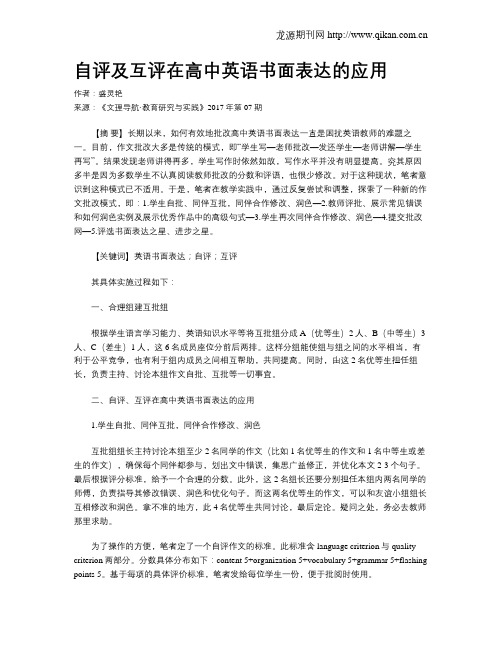
自评及互评在高中英语书面表达的应用作者:盛灵艳来源:《文理导航·教育研究与实践》2017年第07期【摘要】长期以来,如何有效地批改高中英语书面表达一直是困扰英语教师的难题之一。
目前,作文批改大多是传统的模式,即“学生写—老师批改—发还学生—老师讲解—学生再写”。
结果发现老师讲得再多,学生写作时依然如故,写作水平并没有明显提高。
究其原因多半是因为多数学生不认真阅读教师批改的分数和评语,也很少修改。
对于这种现状,笔者意识到这种模式已不适用。
于是,笔者在教学实践中,通过反复尝试和调整,探索了一种新的作文批改模式,即:1.学生自批、同伴互批,同伴合作修改、润色—2.教师评批、展示常见错误和如何润色实例及展示优秀作品中的高级句式—3.学生再次同伴合作修改、润色—4.提交批改网—5.评选书面表达之星、进步之星。
【关键词】英语书面表达;自评;互评其具体实施过程如下:一、合理组建互批组根据学生语言学习能力、英语知识水平等将互批组分成A(优等生)2人、B(中等生)3人、C(差生)1人,这6名成员座位分前后两排。
这样分组能使组与组之间的水平相当,有利于公平竞争,也有利于组内成员之间相互帮助,共同提高。
同时,由这2名优等生担任组长,负责主持、讨论本组作文自批、互批等一切事宜。
二、自评、互评在高中英语书面表达的应用1.学生自批、同伴互批,同伴合作修改、润色互批组组长主持讨论本组至少2名同学的作文(比如1名优等生的作文和1名中等生或差生的作文),确保每个同伴都参与,划出文中错误,集思广益修正,并优化本文2-3个句子。
最后根据评分标准,给予一个合理的分数。
此外,这2名组长还要分别担任本组内两名同学的师傅,负责指导其修改错误、润色和优化句子。
而这两名优等生的作文,可以和友谊小组组长互相修改和润色。
拿不准的地方,此4名优等生共同讨论,最后定论。
疑问之处,务必去教师那里求助。
为了操作的方便,笔者定了一个自评作文的标准。
- 1、下载文档前请自行甄别文档内容的完整性,平台不提供额外的编辑、内容补充、找答案等附加服务。
- 2、"仅部分预览"的文档,不可在线预览部分如存在完整性等问题,可反馈申请退款(可完整预览的文档不适用该条件!)。
- 3、如文档侵犯您的权益,请联系客服反馈,我们会尽快为您处理(人工客服工作时间:9:00-18:30)。
班级:姓名:学号:
评价级别
参照标准
A
B
C
D
自评
小组评
师评
字体是否工整,拼写是否正确,作业是否干净
字体工整,拼写正确,作业整洁
字体基本工整,有少许错误,作业基本整洁
字体欠工整,有涂改现象,文中有一些错误
字体潦草,有多处涂改,很多错误,字数不够
语法、词汇运用是否正确
应用了较多的语法结构和高级词汇
应用简单的语句间的连接成分,使全文结构紧凑
较少使用语句间的连接成分,内容缺少连贯性
语句断短续续,行文不流畅,无连词过度
创造性
有创造性,表现力强
较有创造性,简要,完整
创意不够,较完整
没有创意,内容不完整
能应用一些语法结构和词汇
语法结构单调、词汇项目有限,不影响理解
文章语法错误较多,词汇很有限,影响理解
内容是否பைடு நூலகம்整,要点是否齐全
要点齐全,内容完整,观点不明确
要点基本齐全,内容较完整,有意义
要点基本齐全,内容较完整,内容一般
要点不全,内容过于简单
文章逻辑性是否强,连接是否紧凑
有效地使用了语句间的连接成分,使全文结构紧凑
